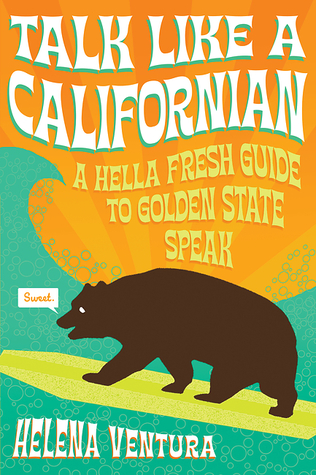‘Talk Like a Californian’
New Guide to Slang from Cultures of North, South, Tech, and Surf

When a package arrived at my office from Prospect Park Press containing a new paperback original called Talk Like a Californian by Helena Ventura, I smiled at the clean, sunny layout and laughed at the wit of the more outrageous of the usage examples. Then I tucked the book away with the idea that it might soon come in handy.
Four days later, I stood in front of a classroom full of high school juniors and seniors at 2 p.m. on a Friday — the last class period of the week. What could I possibly do to capture the imaginations of this entire group with the freedom of the weekend so near at hand? First, we had a quick look at the classic Saturday Night Live sketch known as “The Californians,” and then we began to play the traditional schoolroom game of Dictionary. It’s the one where people have to guess which of the four contestants has given the real definition of a word, while the other contestants get points for creating false definitions that fool their classmates into thinking they are real.
Playing Dictionary with a copy of good old Merriam-Webster is fun, but playing it with Talk Like a Californian is, wait for it, hella fun. Show me a 17-year-old who is tired of making up mock definitions for “tightsauce,” and I’ll show you a child who is tired of Snapchat. Each round of the game brought new heights of zaniness, especially when it came to writing the usage examples. According to the book, “gandolf” is surf-speak for “an older, wiser guy,” but my students kept wanting to make it a verb, as in “gandolf — the act of surfing with a midget on your shoulders.” Usage example? “Dude, let’s hit up Steve for a gandolf sesh.” You will have to imagine what they came up with for “tightsauce” yourself; Talk Like a Californian defines it as “outstanding and/or attractive.”
A week later, I heard from Prospect Park publisher Colleen Dunn Bates that she would be available to take a call in her capacity as spokesperson for the book’s author, “Helena Ventura.” I asked her if we might do the interview as a conference call so that Helena’s high school fans could listen in and ask questions.
What followed was fascinating. The uproarious verbal free-for-all of the California Dictionary game morphed into a sophisticated discussion about etymologies, geographies, databases, and the logic of the research process. Colleen/Helena’s approach to this seemingly fanciful topic turned out to be quite scientific, and part of a literary history that stretched back to popular glossaries of “cowboy talk” published in the 19th century. Bates told the students that most of all, she enjoyed the human contact that the research afforded her, whether that was talking with her adult daughter about the slang of the film industry or exchanging emails with tech bros in order to explore the linguistic subculture of Silicon Valley.
Even if you are not in front of a class on a Friday afternoon like I was, Talk Like a Californian could still help you to flip a bitch (to make a sudden U-turn) in the face of life’s eggy (dull, blah, boring) moments and turn them into golden time (super-duper overtime that typically kicks in for union workers after 16 hours).



